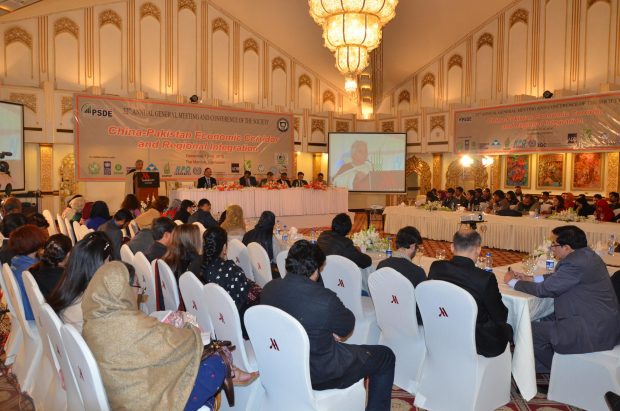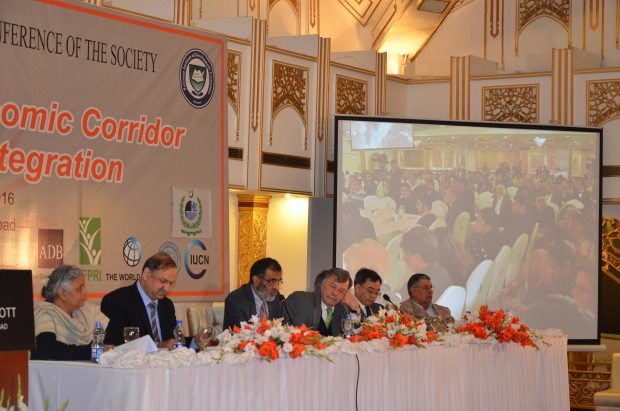Present mainstream of CPEC must to protect fragile Environment of Pakistan
Nazir Siyal – ISLAMABAD: IUCN in partnership with Pakistan Institute of Development Economics (PIDE) organized a panel discussion on Mainstreaming Environment in China Pakistan Economic Corridor (CPEC) during the 32ndAnnual General Meeting of Pakistan Society of Development Economics (PSDE)on the theme of “China-Pakistan Economic Corridor and Regional Integration”.
Abu Ahmad Akif, Secretary Ministry of Climate Change, Government of Pakistan chaired the session and emphasized on climate smart practices at all levels with no exemptions of the responsibilities. He expressed strong confidence in Pakistan and China’s partnership in CPEC for a larger benefit and highlighted the need to explore safer and greener options in technology.
Syed Mahmood Nasir, Inspector General Forest, Ministry of Climate Change envisaged that CPEC is expected to be a bigger structure than the Great Wall of China. He shared the idea of establishing biological corridors to maintain threatened biodiversity in the country. He pointed out that Pakistan is a signatory of the key international conventions. He highlighted Water as an important area to be considered with regard to CPEC. He further said that due to Climate Change, the rain patterns are heavily disturbed and the flood management has become a serious issue.
Mahmood Akhtar Cheema, Country Representative IUCN Pakistan moderated the session and emphasized on the need to be candid in highlighting the issues and to focus on Environmental Impact Assessment (EIA) and Strategic Environmental Assessment (SEA), where IUCN is playing its part over the years. The Environment should be seen as an opportunity. He further stated that IUCN Pakistan and IUCN China are closely working together to assist both the governments to incorporate the environmental aspects into CPEC as it is a development megaproject with the aim to connect Gawadar port in the southwest Pakistan to the Autonomous Region of Xinjian in the northwest of China, via network of highways, railways and pipelines to transport oil and gas. He added that the Global President of IUCN, Xinsheng Zhang visited Pakistan in 2015 and met with the Minister of Climate Change and Minister for Foreign Affairs, where the incorporation of environmental concerns in the CPEC were discussed and strongly endorsed. IUCN Pakistan in collaboration with Ministry of Climate Change has been working on declaration of Marine Protected Area with the objective of biodiversity and ecosystem conservation with the prospects of eco-tourism. IUCN Pakistan has supported Government of Pakistan in developing capacities, guidelines on EIA and SEA as well as the provincial governments in the formulation of the Environmental Protection Acts .
 Ashiq Ahmad Khan, Advisor EvK2CNR highlighted the need to consider the Ecotourism as an industry and focus on biodiversity as its raw material. CPEC route has to be looked into with regard to its impacts on the ecotourism sites. Unique biodiversity pockets along the route have their own significance. He informed that the Siberian cranes over the years have vanished from the country.
Ashiq Ahmad Khan, Advisor EvK2CNR highlighted the need to consider the Ecotourism as an industry and focus on biodiversity as its raw material. CPEC route has to be looked into with regard to its impacts on the ecotourism sites. Unique biodiversity pockets along the route have their own significance. He informed that the Siberian cranes over the years have vanished from the country.
Ambassador Shafqat Kakakhel, Chairperson, Sustainable Development Policy Institute (SDPI) highlighted that both China and Pakistan have Environmental Acts, however the difference can be observed by implementing these Acts. Both of these countries are signatories of a multiple international conventions and all of them consider environmental assessment as an obligation. He highlighted that under CPEC, out of the total 39 power generation projects of Pakistan; 13 are Coal-powered, only 2 Hydro, 2 Solar and 2 Wind Powered projects. Coal being the dirtiest of the fuels, must be subject to Environmental Impact Assessment in a credible and reliable manner. It is important to note that most of these projects under CPEC have been completed upto 60% and if the EIAs have not been conducted for these projects it is a matter of great concern. Pakistan’s environmental situation is seriously fragile.
Professor Mark Gho of University of Singapore emphasized that while we talk of coal as a polluting fuel there is a need to work on the Clean Energy options. The energy cost needs to be brought down. Once energy is cheaper, it will be easier to take care of the environmental aspects. Naseer Memon, Chief Executive of Strengthening Participatory Organization (SPO) pointed that the development and environment should not be considered as separate. Environmental pre-requisites are sometimes taken lightly, where stakeholders consultation is done in a non-communicable way, hence it fails to convey the message and get the correct feedback. EIA must include the cost to environment in case of every project. CPEC is a package of several projects, however separate EIAs will not serve the purpose as the impact will be multiplied due to various projects and their impact will be multiplied. Environment cannot minus people, hence people’s rights must be considered first.
Professor Dr. Rehana Siddiqui, Head of the Department of Environmental Economics at PIDE summed up the discussion and highlighted that economic development is not bad, however, ignoring environmental development is bad. No production can take place without an environmental cost; the key point is to bring these costs to minimum. It is necessary to have the information of both the economic and environmental costs. Currently we lack this information. It requires monetization of all the costs. She emphasized that the environmental assessment of all the projects must be carried out in a serious manner and to build the required capacities. She added that the rules and regulations about Environmental Assessment are important when implemented. It requires collaborated efforts. The federal and provincial ministries need to establish and implement the mechanisms to manage this. She reflected that though the coal is the most polluted fuel, hence exchange of technology from China must be considered to reduce coal hazards under CPEC. Biodiversity conservation, ecotourism are important areas to support the local communities sustaining their livelihood opportunities. If CPEC impacts the livelihood opportunities, there must be alternate livelihood opportunities.


























































